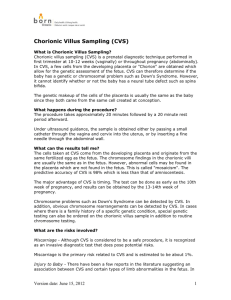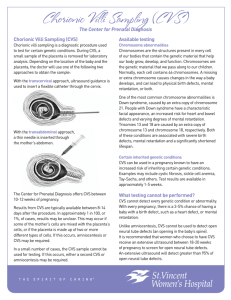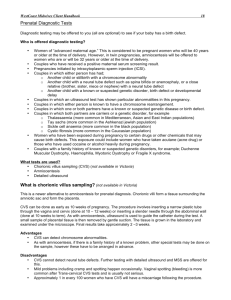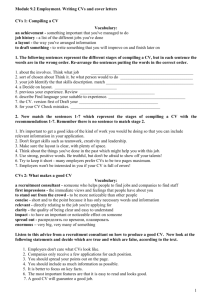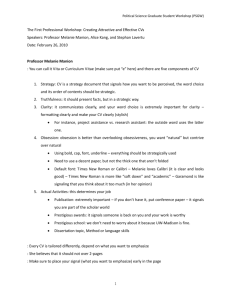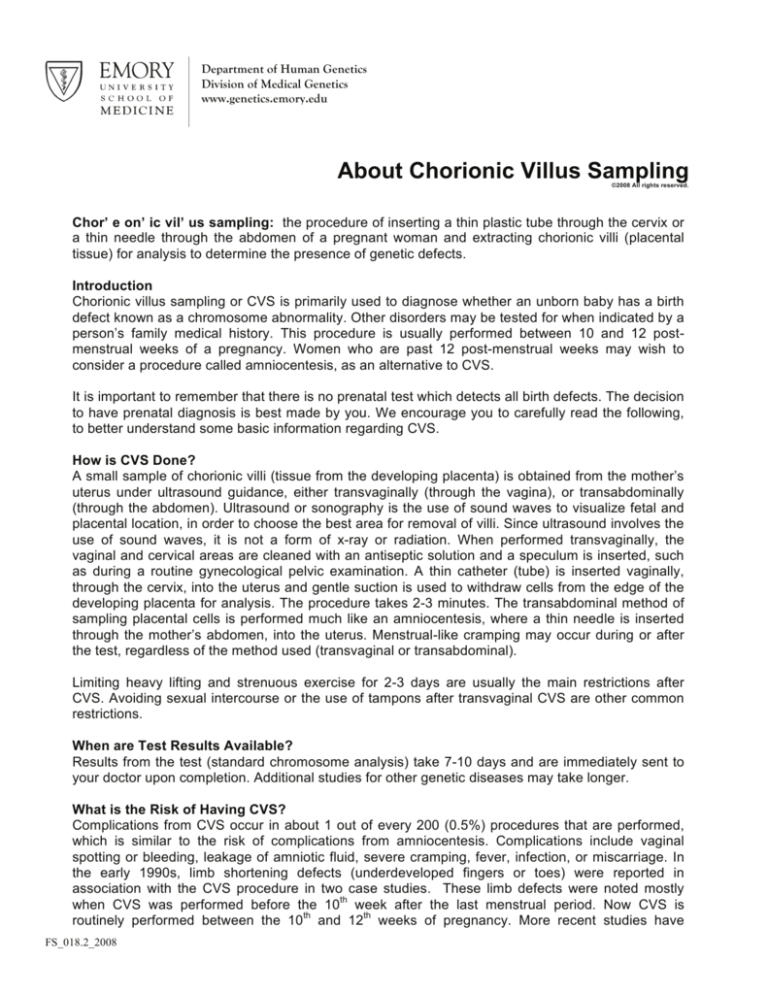
Department of Human Genetics
Division of Medical Genetics
www.genetics.emory.edu
About Chorionic Villus Sampling
©2008 All rights reserved.
Chor’ e on’ ic vil’ us sampling: the procedure of inserting a thin plastic tube through the cervix or
a thin needle through the abdomen of a pregnant woman and extracting chorionic villi (placental
tissue) for analysis to determine the presence of genetic defects.
Introduction
Chorionic villus sampling or CVS is primarily used to diagnose whether an unborn baby has a birth
defect known as a chromosome abnormality. Other disorders may be tested for when indicated by a
person’s family medical history. This procedure is usually performed between 10 and 12 postmenstrual weeks of a pregnancy. Women who are past 12 post-menstrual weeks may wish to
consider a procedure called amniocentesis, as an alternative to CVS.
It is important to remember that there is no prenatal test which detects all birth defects. The decision
to have prenatal diagnosis is best made by you. We encourage you to carefully read the following,
to better understand some basic information regarding CVS.
How is CVS Done?
A small sample of chorionic villi (tissue from the developing placenta) is obtained from the mother’s
uterus under ultrasound guidance, either transvaginally (through the vagina), or transabdominally
(through the abdomen). Ultrasound or sonography is the use of sound waves to visualize fetal and
placental location, in order to choose the best area for removal of villi. Since ultrasound involves the
use of sound waves, it is not a form of x-ray or radiation. When performed transvaginally, the
vaginal and cervical areas are cleaned with an antiseptic solution and a speculum is inserted, such
as during a routine gynecological pelvic examination. A thin catheter (tube) is inserted vaginally,
through the cervix, into the uterus and gentle suction is used to withdraw cells from the edge of the
developing placenta for analysis. The procedure takes 2-3 minutes. The transabdominal method of
sampling placental cells is performed much like an amniocentesis, where a thin needle is inserted
through the mother’s abdomen, into the uterus. Menstrual-like cramping may occur during or after
the test, regardless of the method used (transvaginal or transabdominal).
Limiting heavy lifting and strenuous exercise for 2-3 days are usually the main restrictions after
CVS. Avoiding sexual intercourse or the use of tampons after transvaginal CVS are other common
restrictions.
When are Test Results Available?
Results from the test (standard chromosome analysis) take 7-10 days and are immediately sent to
your doctor upon completion. Additional studies for other genetic diseases may take longer.
What is the Risk of Having CVS?
Complications from CVS occur in about 1 out of every 200 (0.5%) procedures that are performed,
which is similar to the risk of complications from amniocentesis. Complications include vaginal
spotting or bleeding, leakage of amniotic fluid, severe cramping, fever, infection, or miscarriage. In
the early 1990s, limb shortening defects (underdeveloped fingers or toes) were reported in
association with the CVS procedure in two case studies. These limb defects were noted mostly
when CVS was performed before the 10th week after the last menstrual period. Now CVS is
routinely performed between the 10th and 12th weeks of pregnancy. More recent studies have
FS_018.2_2008
provide reassurance that there is not an increased risk for limb reduction defects with CVS
performed at and after 10 weeks of pregnancy. Parents (one or both) are required to sign a consent
form before having CVS. The consent form states that you have been informed of and understand
the risks and benefits of the procedure.
Some women are unable to have CVS performed due to the presence of a vaginal infection, atypical
cervical/uterine anatomy, an abnormal ‘PAP’ smear, or unfavorable fetal/placental position. If CVS is
not possible, another prenatal diagnostic procedure, amniocentesis, can usually be done 2-4 weeks
later.
Who Should Consider CVS?
Chorionic villus sampling may be considered for:
• Any pregnant woman who will be 35 years of age or greater at delivery.
• Individuals who already have a child with a chromosome problem such as Down syndrome.
• Individuals who themselves have a chromosome translocation/abnormality.
• Couples at risk for a prenatally diagnosable genetic condition such as Tay Sachs disease, Cystic
Fibrosis, or Sickle Cell Anemia.
• An ultrasound indicating possible fetal abnormalities.
Which Birth Defects Can be Detected From CVS?
CVS is mainly performed to detect the presence of a chromosome abnormality in an unborn baby.
Down syndrome is a disorder resulting from the presence of an extra #21 chromosome. A
chromosome is a structure in your cells that contains your inherited material, or genes. Humans
usually have 46 total chromosomes in every cell of their body. Having too many or too few
chromosomes results in birth defects and/or health problems. There have been several hundred
different types of chromosome abnormalities seen in humans, with clinical outcomes ranging from
near normal, to life threatening. Children with Down syndrome, for example, are mentally retarded
and have specific facial features. They may also be born with heart problems, gastrointestinal tract
(stomach) problems, or other birth defects. The chances for a baby to be born with Down syndrome
or another chromosome abnormality increases as a woman becomes older.
Most of the time, Down syndrome is not inherited, so that in any pregnancy, there is a chance to
have a baby with Down syndrome. This is true regardless of a person’s family medical history or
how many healthy children they may already have. However, women who will be 35 years of age or
greater at delivery, individuals who already have a child with a chromosome problem, and
individuals who themselves have a chromosome translocation/abnormality are routinely offered
prenatal diagnosis for fetal chromosome analysis because their risk for these problems is high
enough to warrant consideration of the test. Many chromosome problems such as Down syndrome
cannot be seen on ultrasound.
CVS does not detect open neural tube defects. Neural tube defects result when the neural tube, or
developing spine, fails to close properly. During pregnancy, the human brain and spine begin as a
flat plate of cells which ‘rolls’ into a tube, called the neural tube. If all or part of the neural tube fails
to close, leaving an opening, this is known as a “neural tube defect” or NTD. There are two main
types of NTDs: anencephaly (open skull) and spina bifida (open spine).
About 1-2 out of every 1000 babies born will have a neural tube defect (either anencephaly or spina
bifida); this risk is independent of the mother’s age. Most of these babies (9 out of 10) are born to
families who do not have a previous family history for NTDs. Therefore, in any pregnancy, there is a
chance to have a baby with a neural tube defect. This is true regardless of a person’s family medical
history or how many healthy children they may already have. For this reason, it is recommended
that all women of reproductive age take a multivitamin containing folic acid, a B vitamin which
reduces the risk for NTDs to occur.
FS_018.2_2008
Since CVS does not test for NTD’s, all women undergoing this procedure should consider having a
maternal blood test at 16-20 weeks of pregnancy to screen for NTD’s (called a serum alphafetoprotein or AFP assay). When an unborn baby has a neural tube defect, high levels of AFP are
usually found in the amniotic fluid as well as in the mother’s blood. Maternal serum AFP screening is
greater than 85% accurate for detecting neural tube defects. This test can be performed through
your doctor’s office. Many women may also wish to have an additional ultrasound at this time to
evaluate fetal growth and development.
For families who already have relatives with some type of neural tube defect, the chance for their
unborn baby to have a NTD may be higher than the general population risk. Genetic counseling is
recommended for these families to best assess their risk and options for testing.
Finally, CVS can detect other health problems besides chromosome abnormalities. In a family, for
instance, where a previous child has had a rare genetic disorder, CVS can be used to detect some
of these problems, as well as other inherited conditions which produce mental retardation or
physical defects. Genetic counseling is also recommended for these families to assess a couple’s
risks and insure appropriate testing.
How are Chromosome Abnormalities Tested for by CVS?
The chorion is the outer membrane which surrounds the fetus. Early in pregnancy, the chorion is
covered by fingerlike projections called villi. After the twelfth week of pregnancy, part of these villi
will implant into the uterus and become the placenta, while the remainder are reabsorbed. The
fertilized egg produces both fetal tissue and the membranes and tissue (i.e. placenta) surrounding
the fetus, so that the genetic material should be the same. Chromosomes are from the chorionic villi
cells. In the laboratory these cells are separated from the maternal decidua (uterine lining), placed in
an incubator (called a cell culture) and chromosomes are examined under a microscope. Other
genetic diseases may be diagnosed by DNA or enzyme analysis when available and indicated by a
couple’s family or medical history.
How Accurate are the Results?
Chromosome results are greater than 99% accurate. The detection rate of other genetic diseases is
dependent upon the method of testing. Occasionally, results from CVS need to be clarified through
blood tests on the parents, additional ultrasound examinations, amniocentesis, or fetal blood
sampling.
It is important to remember that CVS does not detect all birth defects or genetic diseases, since
prenatal diagnosis is not yet available for many conditions. Every couple in the population has a 34% chance to have a child with a birth defect or health problem, regardless of their
family/pregnancy/environmental histories, or amniocentesis results. The majority of women
undergoing CVS have normal test results and deliver a normal, healthy baby.
What if My Baby does have a Health Problem?
If a health problem is found in your unborn baby from CVS, your doctor will discuss what this
information means for your pregnancy and your options. Your doctor may also refer you to speak
with a genetic counselor or other specialists, for further information regarding your baby’s findings.
Should you have any questions about this information, or if you would like to make an appointment
for genetic counseling, call the Emory Genetics Laboratory at 1-800-366-1502.
FS_018.2_2008

